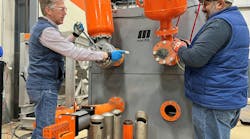With technological change, traditional work practices must be challenged. With great technological change, traditional work practices are challenged again and again and again.
ExxonMobil managers at February’s ARC Conference talked about technology project management, implementation practices and supplier relationships. They agreed that changes in the infrastructure surrounding us call for changes in how we think inside.
"How are problems solved in the most efficient manner?" asked Sandy Vassar, facilities I&E manager for ExxonMobil Development. "For example, a small change in the field can lead to very large changes in documentation."
The efficient way is not always easy. Planning is in large part anticipating unintended consequences, but projects are now more complex, burdened by high costs and promising lower returns.
"Reduced customizations are one way of addressing this complexity," said Vassar. "One result is reduction in engineering hours and design reviews. You tell the automation suppliers you don’t want an engineered solution. You want to have fewer interfaces, reduce the dependencies and trim the documentation."
Pick the winners
Vassar indicated the emerging technologies that some of the best engineering minds at ExxonMobil believe offer real productivity growth. They include:
- Smart, configurable input/output in standard cabinets and junction boxes
- Virtualization in both runtime and engineering environments
- Automated detection, interrogation, configuration, enabling and documentation
- Directly programmed Safety Instrumented System logic solver using translated cause and effect
- Seamless integration between automation and electric power management
- Standard assembly to convert multiple discrete signals to a simple analog signal
- Wireless field instruments
- Increased use of direct current power
Vassar also challenged automation, equipment, machine and instrumentation suppliers to keep their practices abreast of the evolving technology infrastructure.
"Control systems used to age in place," Vassar said. "A system would run without changes for as long as possible. Today a system must consist of building blocks so that rip and replace is never necessary. We need something better for security. Alarm management and graphic development need to be rationalized. We had one project that involved more than 1,400 different graphics."
The future of DCS
Don Bartusiak, chief engineer for process control for ExxonMobil research and engineering, talked about the company’s downstream chemical business and the significant hurdle process industries face as earlier generations of distributed control systems (DCS) face obsolescence.
"We’re not getting enough value from our control systems," said Bartusiak. "The proof is the amount of software development going on above the DCS level. It’s difficult and expensive to replace control systems."
A significant percentage of ExxonMobil refining and chemical control systems will face obsolescence over the next decade, Bartusiak said. However, these systems will not simply be replaced by the latest, state-of-the-art DCS.
Like how early PCs included the keyboard, screen and drives mounted together, traditional DCS is bundled technology.
"For that and other reasons," said Bartusiak, "it lacks sophisticated development tools and is expensive to integrate with third party components. Moreover, its security model is not intrinsic."
Bartusiak said companies will look instead to information technology and control trends delivering the most value to other industries. There he sees greater use of open architectures and virtualization. He looks for further developments related to the Internet of things, wireless and cloud services, and emerging security models.


